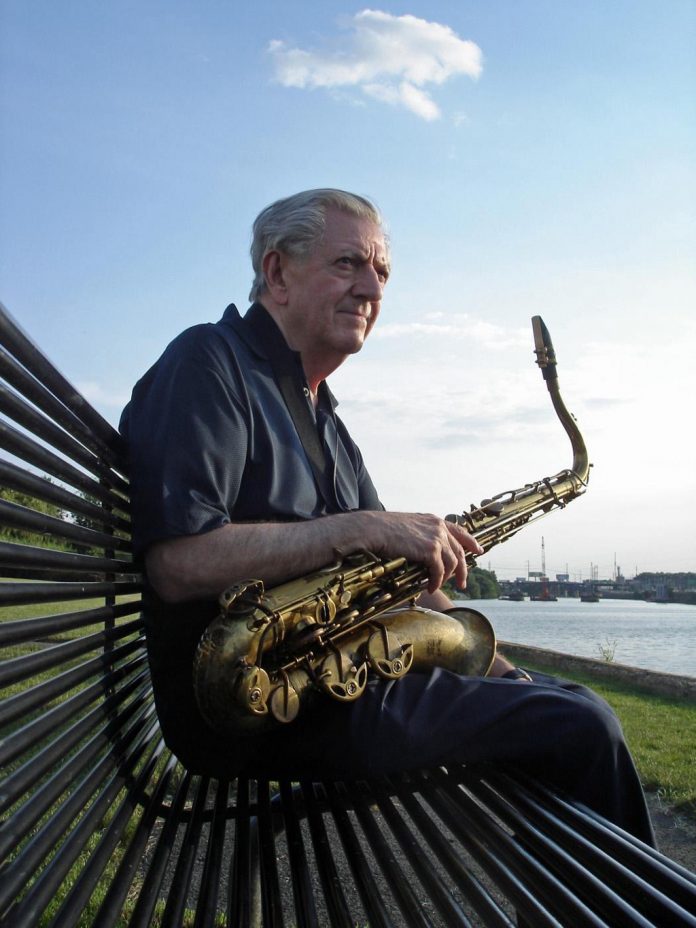Larry McKenna will jazz it up on Friday at the Art Museum. PHOTO COURTESY OF MELISSA GILSTRAP
Frank Sinatra probably never thought twice about it, but Larry McKenna will never forget it.
It was 1976 at the famed Latin Casino in Cherry Hill and Ol’ Blue Eyes was in rare form. His hand-picked conductor, Bill Miller, struck up the band for the next song on the set list. But Frank began singing the lyrics to the wrong tune.
Oops.
The next night, at the same point in the show, Sinatra threw Miller under the bus.
“He said to Bill Miller before the whole orchestra, ‘And don’t screw it up like you did last night,’” recalled McKenna, who backed Sinatra on tenor saxophone throughout a sold-out run at the “Latin.”
“[Sinatra] was a great artist and probably the best singer of that kind of music that ever was, but he also had a personality that a lot of people couldn’t deal with,” McKenna said.
These days, McKenna doesn’t have to deal with pretentious headliners anymore. After some six decades in the music business, the 75-year-old lifelong Olney resident gets to call his own shots.
And pure jazz lovers are reaping the benefits. McKenna has become one of the standard bearers in the legendary Philly jazz scene and still performs dozens of live shows a year, including frequent appearances in the Philadelphia Museum of Art’s summertime “Art After 5” series.
That’s where he’ll be this Friday, sharing his finely aged interpretations of jazz standards as well as original compositions. McKenna’s quartet also will include Tony Miceli on vibraphone, Kevin MacConnell on bass and Dan Monaghan on drums.
“[Jazz] has always been there, and there’s always been a small segment of the population who likes it,” McKenna said. “It’s like three percent of record industry sales are jazz and it’s been that way for many, many, many years. It doesn’t go away. It never does.”
Although not a household name, McKenna has the credentials to impress even the most casual mid-20th century popular music fan. He has performed with Woody Herman, Rosemary Clooney and Tony Bennett, among many other notables.
In the 1970s, he was a member of the “Mothers Fathers Sisters Brothers” orchestra utilized by Gamble and Huff’s Philadelphia International Records at Sigma Sound Studios, appearing as a non-credited performer on recordings by locally developed stars like Patti LaBelle and Harold Melvin & the Blue Notes.
“I played with guys like that. Then the next night, I may [have been] playing at somebody’s wedding,” McKenna said.
In other words, he did whatever it took to make ends meet at the time. But he considered a career change only once.
“The only time I ever did anything else was around 1965 and work in music got to be really slow. I met my future wife and was considering getting married,” he said.
Some friends persuaded him to enroll in barber school.
“I hated the barber thing. I never really wanted to do it,” McKenna said. “I worked at it for a year and a half and then I got a steady gig playing music.”
He doesn’t even have to bother with weddings or backup studio gigs anymore.
In addition to his playing, McKenna has developed an extensive following as a sax and jazz theory teacher, having instructed classes at the University of the Arts, Temple, West Chester, Widener and Community College of Philadelphia.
Now, as a widower and empty-nester, McKenna has the freedom to dedicate himself fully to his own inspirations.
He is the lead performer on three LPs, most recently 2009’s Profile, and is working on a new album due out this fall. And with his polished improvisational style, he is viewed as a bridge between his genre’s golden age and newer generations of musicians.
“Each person has a style,” he said. “You develop a sound and a certain phrasing. It’s like a voice. This is something you work to develop over years.
“It’s sort of like hearing a young person speak, then an old person speak. I’m not talking about the technical part of [playing]. It’s the voice you get after having lived through a whole bunch of stuff.” ••
“Art After 5” performances begin after 5 p.m. and are held in the Philadelphia Museum of Art’s Great Stair Hall. Performances are included in the regular museum admission price. Call the museum at 215–684–7506 or e-mail to [email protected] for more information.





